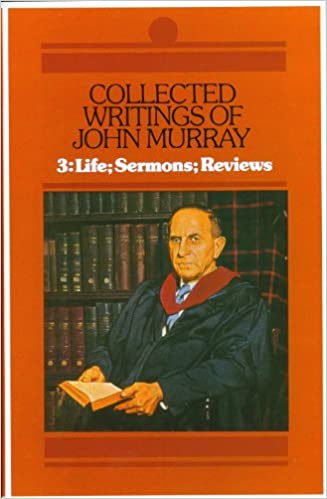A Brief Book Summary from Books At a Glance
by Steve West
About the Author
John Murray was a distinguished theologian, preacher, and author. He served as Professor of Systematic Theology at Westminster Theological Seminary from 1937-1966.
*Note on Summary of Volume Three:
This volume consists of three major parts. Part One of this volume consists of a biography of John Murray written by Iain H. Murray. It is an excellent introduction to Murray’s life. For those who have read Iain Murray’s two-volume biography of Dr. Martyn Lloyd-Jones, his skill as a biographer needs no explanation. In our estimation, this section alone makes acquiring the volume worthwhile. Given the nature of a biography, however, this section has not been summarized.
The third major part consists of short book reviews, and although they are edifying, we will not be summarizing them since a fair summary would have to present both the main points of the book being reviewed and then Murray’s interaction with it. In many cases, this would require virtually reproducing the review entirely.
Part Two contains a selection of Murray’s sermons, and this part is summarized in its entirety. We trust that the readers of these sermons will be blessed and edified.
Summary
Part Two: Sermons
-
The Mystery of Providence (Job 23:10-12)
All evil is the consequence of sin. The wages of sin is death, and the entire creation groans because of the effects of sin. Because of Adam’s sin, the ground itself was cursed. Death in this world is the epitome of evil and sin’s consequences. It is necessary to make distinctions about evil in the world. Some evils come as the direct punishments of God’s justice towards the wicked, while others are loving chastisements for his children. Some evils are trials that reveal the integrity of God’s people, while others are used to promote the gospel. Christ’s sufferings in providing atonement were completely unique. Job’s trials were not sent as punishment or for correction, but rather to demonstrate his purity and integrity. They were sent to vindicate his character and to vindicate God’s honor. Job’s sufferings proved that he was not following God for material and temporal blessings. From this, we learn that not every suffering in the life of a believer is due to their sin. Job was confident not because he was sinlessly perfect, and not because he understood what was happening, but because he had to place his confidence in God and God’s providence. We may not know what is being accomplished, but we know that God knows and that he is wise. Job could also have confidence because his conscience agreed with God’s judgment that he was not guilty of what his friends were accusing him of. We have heard of Job’s patience, and his patience was perseverance rooted in faith in God; it was not fatalism. In the midst of trials, we are to actively hope and trust in God. . . .
[To continue reading this summary, please see below....]The remainder of this article is premium content. Become a member to continue reading.
Already have an account? Sign In
Buy the books

COLLECTED WRITINGS OF JOHN MURRAY, VOLUME 3: LIFE; SERMONS; REVIEWS, by John Murray